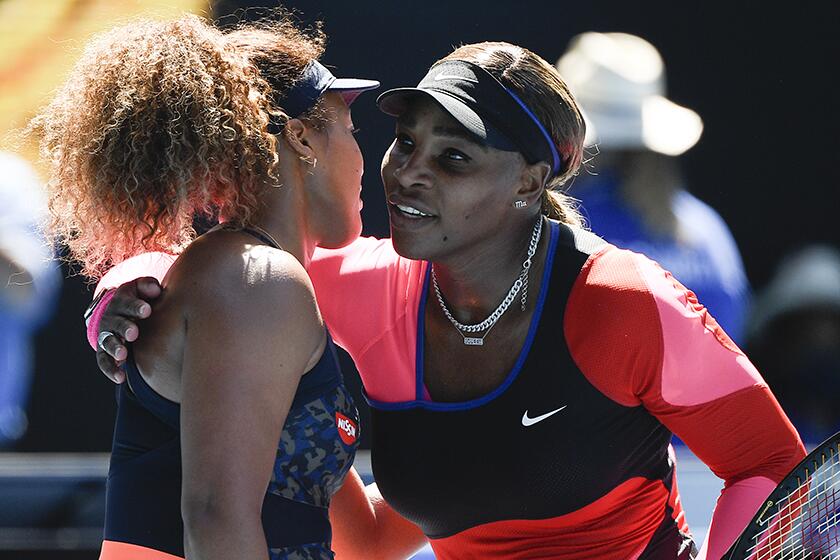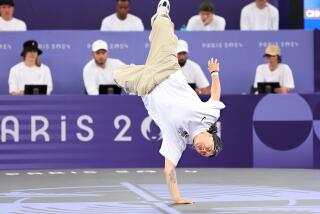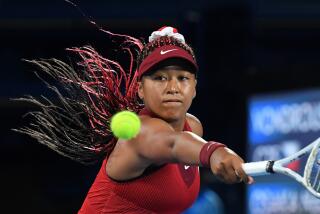Column: Naomi Osaka adds to her growing legend with Australian Open triumph
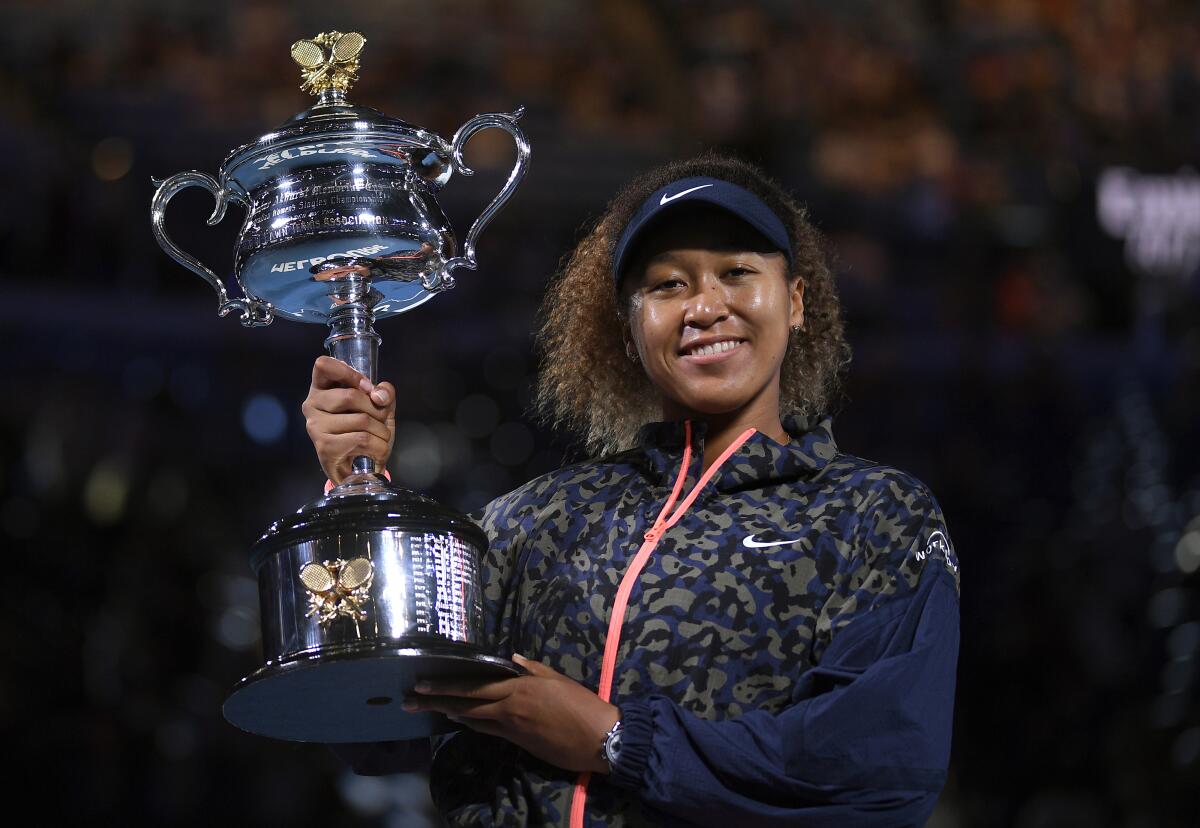
- Share via
Her mission accomplished, her will occasionally tested but never near breaking, Naomi Osaka calmly walked toward the net and stepped into history after securing her status as the most dominant active player in women’s tennis.
Her 6-4, 6-3 victory over former UCLA standout Jennifer Brady in the Australian Open final added a sparkling gem to Osaka’s string of glowing successes. She won the U.S. Open in 2018, the Australian Open in 2019 and the U.S. Open again last year before she prevailed again in Melbourne on Saturday, joining Monica Seles and Roger Federer as the only two players in the Open Era (since 1968) to win their first four Grand Slam finals.
“That’s very amazing company,” said Osaka, who gave her first Slam trophy to her parents and keeps the other two at her Beverly Hills home for inspiration. “I hope that I can have, like, one grain of how their career has unfolded.”
Osaka is well on her way to her own stellar career. In extending her match winning streak to 21 she became the 15th woman in the Open Era to win four majors. The only other active women in that group are Serena Williams (23), Venus Williams (seven) and Kim Clijsters (four).
“It’s really weird when you get to that final point, you start trembling because you can think of the ‘what-ifs,’” Osaka said. “For me, I feel like I’m living in a ‘what-if’ right now.”
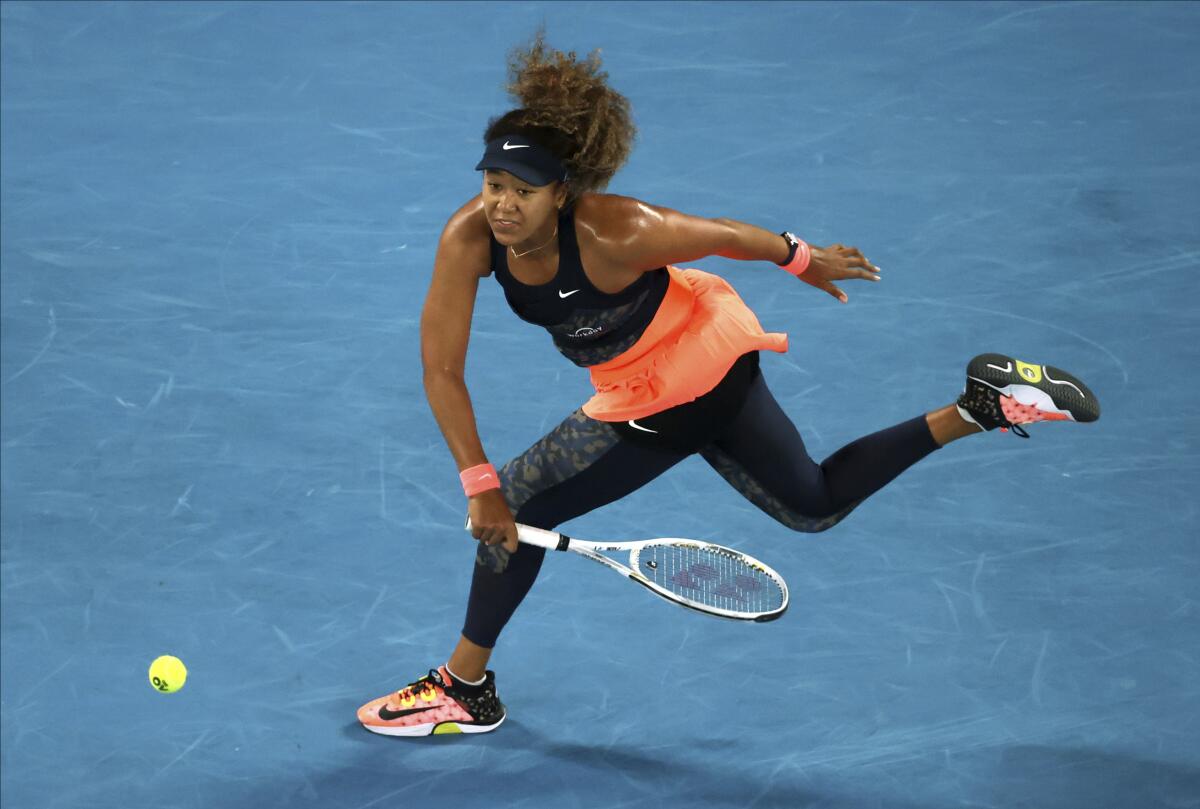
Osaka, 23, had a tough draw in Melbourne that put in her path two previous Slam champions, Garbine Muguruza and Serena Williams. Osaka fought off two match points in the fourth round against Muguruza and had to fight her inclination to be intimidated by Williams in the semifinals. Osaka prevailed 6-3, 6-4 over the woman she has long idolized. To Osaka, Williams will always be the face of the game. Osaka’s feats won’t change that. “No, not at all,” Osaka said.
Williams long ago achieved the legendary status that Osaka seems destined for now. Osaka’s power game and her resolve are like Williams’ and they got her past her early nerves and erratic first serve Saturday. “Why was I so nervous?” she said. “You don’t go into a final wanting to be the runner-up.”
Still, the outcome against first-time Slam finalist Brady was never in doubt. Brady, who had lost an entertaining three-set semifinal match to Osaka at last year’s U.S. Open, pushed back as best she could but was undone by 31 unforced errors, to 15 winners. That she got this far was remarkable: She was among 72 players confined to a hard lockdown after they arrived in Australia because of COVID-19 protocols. She had to make do with exercise equipment and turn a mattress into a backboard.
She took it with good grace and praised Australian officials for staging the tournament. Spectators were allowed in for all but five days. “I made my first Grand Slam final, so maybe if I wasn’t in quarantine I would have won,” she said, smiling.
Brady double faulted twice in the fourth game of the first set and Osaka broke her serve for a 3-1 lead. But just as it seemed the set would slip away, Brady steadied herself and broke Osaka’s serve, with the help of a couple of errant backhands hit by Osaka. That cut Osaka’s lead to 3-2, and Brady leveled the set at 3-3 by holding serve.
Osaka held for 4-3 and had a break point in the eighth game but couldn’t capitalize. Brady held and gained a break point in the next game but committed two unforced errors, allowing Osaka to hold serve and go ahead. Brady had a 40-15 lead in the 10th game but her forehand deserted her. Osaka took the first set when a rueful Brady netted a forehand. “I tried to mix it up. I felt rushed, like she was applying pressure,” Brady said.
Brady continued to have difficulty handling shots coming at her so quickly on the fast court, and Osaka took advantage. She took a 2-0 lead in the second set by breaking Brady’s serve in the second game. Osaka held serve for a 3-0 lead and gained another break for 4-0.

Highlights from Naomi Osaka’s win over Jennifer Brady in the women’s singles final at the Australian Open on Saturday.
“She played really well when she had to. She hit good shots when she needed them,” Brady said. “In those moments, that’s the toughest time to find those shots, to put you on defense when it’s the big moments.”
Brady gained support from the crowd of about 7,800 as she broke Osaka’s serve in the fifth game and narrowed Osaka’s lead to 4-1. Brady held serve and Osaka held for 5-2, but Brady kept fighting and held again. But Osaka couldn’t be stopped. She won on her first opportunity, when Brady hit a return long.
Asked whether there’s magic behind Osaka’s success, Brady said the secret is hard work and clutch play. “She’s human, like the rest of us in this [interview] room. She just brings out her best in the big moments,” Brady said. “She’s won four Grand Slam titles. She knows what she’s doing out there. She’s confident in herself, her game, her team.
“But I don’t think she’s God. I think maybe Serena is,” Brady said, smiling. “Maybe she’ll get there. I don’t know.”
Before Osaka can reach similarly exalted status she’ll have to expand her mastery beyond hard courts to include clay and grass, as Williams did. Osaka’s coach, Wim Fissette, thinks it’s possible. “She’s kind of a natural mover on the court and just seeing, like, the way she moves, the way she has the easy power, the way she can build the points, there are a lot of things that I see why she could really perform well on clay,” he said earlier in the week.
Naomi Osaka defeated Serena Williams in straight sets to advance to the Australian Open final and deny Williams’ bid for major title number 24.
Osaka is ready to push herself to succeed there, too. “The funny thing is I don’t look at expectations as a burden anymore,” she said. “I feel like I’m at the point now where it’s something that I’ve worked for. Like, people wouldn’t expect things from me if I hadn’t done things prior, if that makes sense.”
It makes perfect sense. So does her continued ascent to levels few other women in the sport have reached.
More to Read
Go beyond the scoreboard
Get the latest on L.A.'s teams in the daily Sports Report newsletter.
You may occasionally receive promotional content from the Los Angeles Times.

